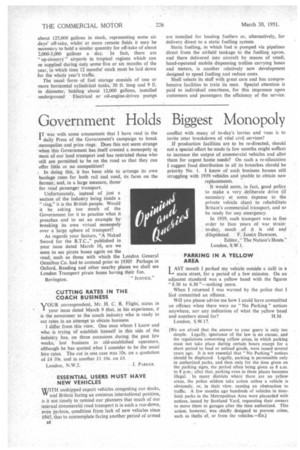Government Holds Biggest Monopoly
Page 42

If you've noticed an error in this article please click here to report it so we can fix it.
IT was with some amusement that I have read in the I daily Press of the Government's campaign to break monopolies and price rings. Does this not seem strange when this Government has itself created a monopoly ii most of our land transport and has restricted those who still are permitted to be on the road so that they can offer little or no competition?
In doing this, it has been able to arrange its own haulage rates for both rail and road, its fares on the former, and, in a large measure, those' for road passenger transport.
Unfortunately, instead of just a section of the industry being inside a " ring," it is the British people. Would it be asking too much of the Government for it to practise what it preaches and to set an example by breaking its own virtual monopoly. over a large sphere of transport?
As regards your feature, "A Naked Sword for the B.T.C.," published in your issue dated March 16, are we soon to see pirate buses again on the road, such as those with which the London General Omnibus Co. had to contend prior to 1930? Perhaps in Oxford, Reading and other nearby places we shall see London Transport pirate buses having their fun.
Bovington. "JUSTICE."
CUTTING RATES IN THE COACH BUSINESS VOUR correspondent, Mr. H. C. R. Flight, states in I your issue dated March 9 that, in his experience, it is the newcomer to the coach industry who is ready to cut rates in an attempt to obtain business
I differ from this view. One man whom I know and who is trying td establish himself in this side of the industry has, on three occasions during the past few weeks, lost business to old-established operators. although he has quoted what I consider to be the usual hire rates. The cut in one case was 10s. on a quotation of £4 10s. and in another El 10s. on £4.
London, N.W.2. . J. PARKER.
ESSENTIAL USERS MUST HAVE NEW VEHICLES
wiTH unshipped export vehicles congesting our docks, " and Britain facing an ominous international position, is it not timely to remind our planners that much of our internal commercial road transport is in such a run-down, even parlous, condition from lack of new vehicles since 1945, that to contemplate facing another period of armed
B8 conflict with many of to-day's lorries and vans is to invite utter breakdown of vital civil services?
If production facilities are to be re-directed, should not a special effort be made (a few months might suffice) to increase the output of commercial vehicles and allot them for urgent home needs? On such a re-allocation I suggest food distribution in all its branches should be priority No. 1. I know of such business houses still struggling with 1939 vehicles and unable to obtain new replacements.
It would seem, in fact, good policy to make a very deliberate drive (if necessary at some expense to the private vehicle class) to rehabilitate Britain's commercial transport, and so be ready for any emergency.
In 1939, such transport was in fine order to face years of war strain: to-day, much of it is old and dilapidated. F. JAMES DAWSON, Editor, "The Nation's Hosts." London, S.W,1.
• PARKING IN A YELLOW AREA
LAST month I parked my vehicle outside a tafd in a main street, for a period of a few minutes. On an adjacent standard was a yellow band with the figures "8.30 to 6.30 "—nothing more.
When I returned I was warned by the police that I had committed an offence.
Will you please advise me how I could have committed an offence when there were no "No Parking" notices anywhere, nor any indication of what the yellow band and numbers stood for? H.M. London. S.W.17.
[We are afraid that the answer to your query is only too simple. Legally, ignorance of the law is no excuse, and the regulations concerning yellow areas, in which parking must not take place during certain hours except for a short period to load or unload goods, were issued several years ago. It is not essential that "No Parking" notices should be displayed. Legally, parking is permissible only in authorized parks, and then only for the time given on the parking signs, the period often being given as 8 a.m. to 8 p.m.; after that, parking even in these places becomes illegal. In many districts where there are no yellow areas, the police seldom take action unless a vehicle is obviously, or, in their view, causing an obstruction to traffic. A few months ago hundreds of vehicles in timelimit parks in the Metropolitan Area were placarded with notices, issued by Scotland Yard, requesting their owners to move them to garages after the time authorized. This action, however, was chiefly designed to prevent crime, such as thefts of, or from the vehicles.—En.]












































































